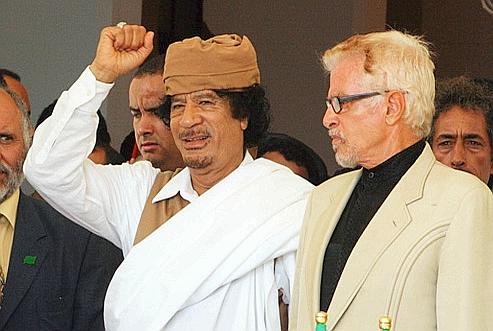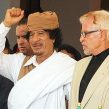
BRIEFS
Publication: Terrorism Monitor Volume: 10 Issue: 15

The Congolese province of Nord-Kivu, which borders both Rwanda and Uganda on its eastern side, is a land of active volcanoes, mountain gorillas, valuable minerals, warring militias and over 200,000 displaced people. It is also home to M23, a new and powerful militia composed of veteran rebels and professional soldiers. Well-armed and apparently more capable than local units of the national army, M23 poses a new challenge to efforts to restore stability to a region of the Democratic Republic of the Congo (DRC) that has been in a state of upheaval since the genocide in neighboring Rwanda in 1994.
M23 has its origins in the Nord-Kivu-based Congrès national pour la défense du peuple (CNDP) of General Laurent “The Chairman” Nkunda, a Congolese Tutsi. The largely Tutsi CNDP is believed to have been sponsored by Rwanda to fight a proxy war with the Hutu supremacist Forces démocratiques de libération du Rwanda (FDLR), a militia formed partly by former Hutu genocidaires. With the CNDP under pressure from an offensive by Congolese and Rwandan troops, the movement’s leadership split in January 2009. Nkunda was arrested and detained in Rwanda while General Bosco “The Terminator” Ntaganda, a Rwandan Tutsi wanted by the International Criminal Court (ICC) for war crimes committed while both a rebel and an officer in the DRC national army, took control of the movement. Ntaganda agreed to integrate his forces with the Congolese national army, the Forces armées de la République Démocratique du Congo (FARDC), according to the terms of the March 23, 2009 peace agreement, which also ensured Kinshasha would not pursue the ICC warrants against Ntaganda and other CNDP officers. The ICC issued a fresh arrest warrant against Ntaganda on July 13 related to crimes against humanity, murder, rape, pillaging, recruitment of child soldiers and sexual slavery (AFP, July 13). Thomas Lubanga, Ntaganda’s former commander in the Union des Patriotes Congolais (UPC) / Forces Patriotique pour la Liberation du Congo (FPLC), was sentenced to 14 years in prison by the ICC earlier this month for recruiting and using child soldiers in the early 2000’s.
M23 is named for the March 23, 2009 peace agreement that movement leaders claim Kinshasha has failed to honor (East African [Nairobi], July 16). The movement was born when Colonel Ntaganda led a March mutiny of up to 600 soldiers in Nord-Kivu. Though poor living conditions, pay interruptions and other reasons were cited, it is likely that the main causes of the military revolt were a plan to transfer the former CNDP troops under Ntaganda’s command to another part of the DRC and a rumor that President Joseph Kabila had taken a new interest in enforcing the ICC warrant against Ntaganda. Colonel Ntaganda and other Tutsi officers profited from their control of rich mining areas of Nord-Kivu and by trading in tropical hardwoods grown in the region. The Tutsi officers and their men have opposed any transfer from the lucrative Kivu provinces and pose locally as the “protectors” of the Banyamulenge, Congolese Tutsis who live in the region. In the field with Ntaganda are three other senior officers, Colonel Baudouin Ngaruye, Colonel Innocent Zimurinda and Colonel Innocent Kaina, all of whom are accused of massacring civilians, mass rape, mutilations, and other crimes while profiting from illegal taxes on charcoal production and mining operations (IRIN [Nairobi], June 23; AFP, July 13).
The M23 movement can be viewed as a revival of the CNDP under a different name, but including many of the same individuals, leading Kinshasha to accuse Rwanda of resuming military and financial assistance to the militia. Congolese concern on this point is understandable – Rwandan forces have invaded the eastern DRC twice since 1998. Kigali in turn believes that Kinshasha has resumed support for Hutu extremists in the FDLR who are allegedly planning terrorist attacks in Rwanda.
A recent M23 offensive in a region bordering the Virunga national park captured the border town of Bunangana on July 6 and drove some 600 FARDC troops and thousands of refugees into Uganda (East African [Nairobi], July 16). The soldiers were disarmed and eventually returned to the DRC. Days later, a M23 spokesman announced the movement had pulled out of the area taken, saying the movement sought to bring the government to negotiations rather than control territory (AFP, July 13). The towns of Kiwandja and Rutshuru were handed over to local police and troops belonging to the UN peacekeeping force, the Mission de l’Organisation des Nations Unies en République démocratique du Congo (MONUSCO). When the towns were re-occupied by FARDC troops the M23 warned the army to get out “or be held responsible for all the consequences” (AFP, July 13).
Believing that M23 was intent on seizing the Nord-Kivu capital of Goma, MONUSCO and the Congolese army deployed over a dozen tanks on the road to Goma. The M23, however, denied it had any such intentions: “Our mission is not to go to Goma. We are strong but we are also disciplined. We know what we are doing” (AFP, July 12; Xinhua, July 13). Three UN and two DRC MI24 and MI25 helicopters flown by Ukrainian pilots strafed M23 positions in the hills of southeast Virunga National Park with rockets and 30mm rounds (AFP, July 13).
In a recent meeting of the 11 nation International Conference on the Great Lakes Region (which includes Rwanda and the DRC), it was agreed to accept a “neutral international force” to eradicate M23, the FDLR and other armed groups in the region (Daily Monitor [Kampala], July 16AFP, July 15). [1] The idea was then endorsed by the African Union. As of yet, however, potential contributors to this force have not been identified. Meetings on this issue are planned for Kampala at an August 6-7 summit of Great Lakes states (Agence Rwandaise d’Information, July 16). In the meantime, there are reports that the Rwanda Defence Forces (RDF) and the Congolese troops of the FARDC have agreed to mount joint patrols along their common border (Africa Review, July 17). Plagued by indiscipline, FARDC is often viewed as nearly as great a threat to Congolese security as the militias it is supposed to be fighting.
In mid-July, roughly two dozen M23 fighters deserted and surrendered to UN forces, saying they had been recruited in Rwanda and sent to the DRC. However, when the UN took these individuals to the Rwandan border for repatriation, Rwandan authorities refused to accept them, saying there was no evidence they were Rwandan nationals. Rwanda did accept the return of seven members of the Hutu FDLR (AFP, July 15). The ICC issued a warrant this month for FDLR commander Sylvestre Mudacumura, a Rwandan Hutu facing nine counts of war crimes.
Much of the community in Nord-Kivu views the ongoing violence in the region through a prism of tribal rivalries. With M23 being composed largely of Tutsis, senior members of the DRC’s ruling party have used public rallies broadcast on state TV to threaten to hunt down all Tutsis in the DRC and send them to Rwanda. Street children and taxi drivers in Goma have used such threats as a license to attack anyone who looks like a Tutsi (IRIN [Nairobi], July 14).
Note
1. The ICGLR is composed of 11 states: Angola, Burundi, Central African Republic, Republic of Congo, Democratic Republic of Congo, Kenya, Uganda, Rwanda, Sudan, Tanzania and Zambia.
“A MAN WITH NO LIMITS OR RESTRICTIONS”: NEW REVELATIONS FROM THE COURT OF MU’AMMAR GADDAFI
According to a former Libyan official who was intimately acquainted with Mu’ammar Gaddafi’s personal and political affairs, “Al-Gaddafi was a man with no limits or restrictions; he did anything he wished. He was tyrannical and arrogant. He thought that no one had the right to take him to account about anything.” The revelations emerged in a five-part interview by a pan-Arab daily of Nuri al-Mismari, a former state protocol secretary with the rank of minister of state (al-Hayat, July 15; July 17; July 18; July 19). Al-Mismari was in Gaddafi’s inner circle of aides and retainers, a position that gave him unique access to the personal and state secrets of the Gaddafi regime, secrets that would later place his life in jeopardy before he split from the regime in 2010.
- Gaddafi hated Iraqi leader Saddam Hussein, “cursing him and calling him petty, stupid and reckless.” Gaddafi backed the Iraqi opposition while Saddam supported Gaddafi’s enemies in Chad.
- Gaddafi appears to have been infatuated with former American Secretary of State Condoleezza Rice: “He invited her to dinner, and when she entered his private suite, she saw her portrait in a frame, hanging on a wall in his suite. When she saw it, she was shocked.” Gaddafi lavished gifts on Rice worth over $212,000, including a diamond ring and a locket with Gaddafi’s picture in it. When rebels seized Gaddafi’s compound in August, 2011, they discovered a photo album full of pictures of the Secretary of State (CBS, August 25, 2011).
- Gaddafi was fond of referring to presidents and kings alike as “my son,” including U.S. president Barack Obama: “He used to do that on purpose in order to belittle people. We used to beg him not to say ‘My Son’ when addressing leaders.”
- Gaddafi was especially arrogant in his visits to Leonid Brezhnev in the Soviet Union: “[Gaddafi] would set an appointment then be deliberately late. Then, Brezhnev would go and wait for him outside his room at the Kremlin until he came out. It was embarrassing. Brezhnev was old and he could barely walk. Gaddafi would say that he was coming and Brezhnev would wait and wait.”
- Gaddafi liked to summon visiting leaders in the middle of the night, including Nelson Mandela: “[Gaddafi] told me to get dressed and to fetch Mandela, who was visiting Libya after having left the post of president. I spoke to Mandela’s adviser and he said: "Are you insane? The man is asleep and he is sick and his knees hurt." I told him: "these are the instructions." He said: "What kind of instructions? Do you think that Mandela is an employee of yours? I will not allow anyone to wake him up.”





